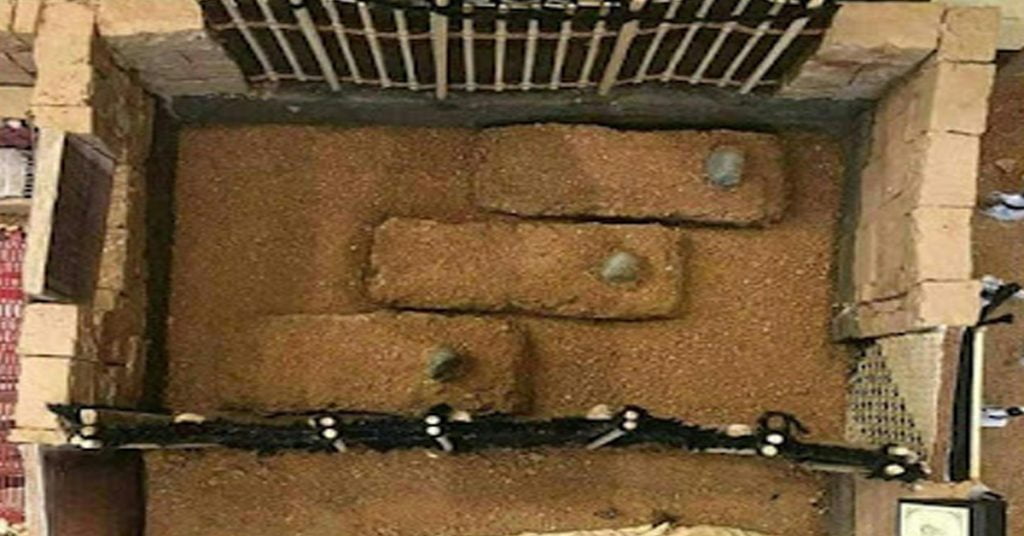Did Abu Talib the uncle of the Prophet Mohammad


Did Abu Talib the uncle of the Prophet Mohammad
Abu Talib was the son of Abdul Muttalib and the father of Amirul Mu’minin Ali (AS). Many Muslims believe that he was a believer in the message of the Prophet (peace be upon him) and was a devoted helper and full confidant of the Prophet (peace be upon him) in the face of various problems and crises in the early days of Islam. Abdullah (peace be upon him), the father of the Prophet (peace be upon him), died before the birth of his son Muhammad (peace be upon him). At that time, grandfather Abdul Muttalib (peace be upon him) and uncle Abu Talib took care of the child prophet. And after the death of Abdul Muttalib, Uncle Abu Talib brought his nephew 6-year-old Muhammad (peace be upon him) to his house and raised him like his own son. It is known from history that the father and grandfather of the Prophet (peace be upon him) were monotheists or Hanif and the father of any prophet was never a kaafir.
Abdul Muttalib, the father of Abdullah and Abu Talib, did not abandon the worship of Allah even during the most difficult and perilous period of his life and did not hesitate to support the religion of monotheism. When a large army of Abrahah’s elephants rode towards Mecca to destroy the Ka’bah, they seized some of Abdul Muttalib’s camels on the way. Then when Abdul Muttalib (AS) came to him to take back the camels, Abrahah was surprised and asked: Why did you not ask my army to take back the camels and not to destroy the Ka’bah?
Then Abdul Muttalib (AS) with full faith and trust in Allah said:
“I am the owner of these camels and the lord of this Ka’bah will protect it.” (Kamel Ibn Asir)
He then set out for Mecca and came to the Ka’bah and grabbed the door of the Ka’bah and said:
“O my Lord! I don’t trust anyone except you. O my Lord! Protect your safe haven. The enemies of this house are at war with you. Stop them from destroying your house. ” (Kamel Ibn Asir)
These words are a clear proof of Hazrat Abdul Muttalib’s belief in Allah. Yaqubi writes about Abdul Muttalib (AS) in his history book:
“Abdul Muttalib was far from idolatry and did not worship anyone but the glorious and glorious God.” (Jacob on date)
Did Abu Talib the uncle of the Prophet Mohammad
Abu Talib in the eyes of Abdul Muttalib:
Looking at the evidence at various stages of history, it is clear that some of the clear-hearted and proponents of the future informed Abdul Muttalib about the bright future of the Prophet (pbuh) and his prophethood.
When Saif ibn Yazan took over the rule of Abyssinia, Abdul Muttalib became the head of a delegation and came to his court. After some pleasant or eloquent speeches, the king gave him (Abdul Muttalib) the good news that a revered prophet would come to your family. Then he said about the characteristics of the Prophet (peace be upon him):
“His name is Muhammad (pbuh). (In infancy) his parents will die and his grandfather and uncle will take care of him. ” (Siraye Halabi)
After describing some more features of the Prophet (peace be upon him), he said to Abdul Muttalib:
“Surely you are his grandfather, O Abdul Muttalib.” (Siraye Halabi)
After hearing this good news, Abdul Muttalib performed the prostration of Shukrana and said about the unborn holy child:
“I had one of my favorite children. I married him to a glorious woman whose name was Amena bint Wahab bin Abd Manaf bin Zuhrah. That woman gave birth to a son whom I named Muhammad. When his parents died some time later, I and his uncle (Abu Talib) took care of him. ” (Siraye Halabi)
It is clear that Abdul Muttalib, being aware of the bright future of the orphan child, took the initiative to hand over the responsibility of raising the child to his dearest son Abu Talib after himself and deprived others of this opportunity.
It is also clear that Abu Talib held that high position of faith in the eyes of his monotheistic and believing father. Therefore, he was the only one among the children to be considered worthy of the care of the Prophet (peace be upon him).
Evidence of the faith of Hazrat Abu Talib (ra):
1. Abu Talib’s literary works and scholarly works:
Islamic historians and muhaddiths have narrated some of Abu Talib’s elegant qasidas (special types of poems or songs). From the meaning of the various verses included in those high quality poems we can be sure of his faith. Here are just a few of his many poems:
Did Abu Talib the uncle of the Prophet Mohammad
Respected people should know that Muhammad (peace be upon him) is a prophet like Prophet Moses and Jesus son of Mary. And he has the guidance or the direction of liberation that he had. Therefore, all the prophets guide people by the command of Allah and keep them from sinning. ” (Al-Hujja and Mustadrake Hakim)
“Do you not know that we found Muhammad (peace be upon him) as a prophet like Moses (peace be upon him) whose descriptions are given in the heavenly scriptures? People love him, and it is not right to do injustice to the one whom God the Almighty has given love to. ” (Dated Ibn Kathir)
“Allah Almighty has honored His Prophet Muhammad. Therefore, the best creation is Ahmad. Allah the Almighty has determined the name of the Prophet from the root of his name so that you can honor him. So, the lord of the throne is ‘Mahmud’ (praised) and his prophet is Ahmad (highly praised). ’(Sharh Nahjul Balagah)
“O Messenger of Allah (peace be upon him), the hand of the enemy will never reach you until I sleep on a bed of earth (until I die). So do not be afraid. Reveal what you have been instructed to do, and give good news, and enlighten your eyes. You have called me to the religion of Allah and I know that you wish me well and be firm and honest in your call. I knew for sure that Muhammad’s religion was the greatest religion in the world. ” (Khazanatul Adab Baghdadi)
“O Allah’s witness over me, bear witness that I believe in the religion of Ahmad or the Prophet (peace be upon him). Whoever goes astray, I am in guidance.” (Sharh Nahjul Balagah)
In the last days of his life, Abu Talib, with the help of the Prophet (peace be upon him), composed the following poem for the Quraysh tribesmen:
“I urge all four to cooperate with the Prophet of Truth or Welfare: my son Ali, the chief of our tribe, Abbas, the lion of God, Hamzah, who is defending his truth (Iman) and my other son Jafar so that he may be his companion and ally. May my mother and her children be sacrificed for you. Always be like a shield against the enemy for the sake of the Prophet (peace be upon him). ”
2. Abu Talib’s treatment of the Prophet (peace be upon him) is one of the proofs of his strong faith:
All the famous Muslim historians respectfully remember the unprecedented self-sacrifice and sacrifice of Hazrat Abu Talib (RA) for the protection of the Prophet (SAW). And this is another clear proof of his firm faith.
Abu Talib, as a refugee for three years of his life, with the help of Islam and the protection of the Prophet (peace and blessings of Allaah be upon him), preferred to stay with the Prophet (peace and blessings of Allaah be upon him) in Shoaib Abu Talib. ) He stood by them even after enduring unbearable hardships till the last day of the boycott. That area of Mecca is still known as Shobe Abi Talib.
In addition, Hazrat Abu Talib instructed his son Ali (AS) to cooperate fully with the Prophet (SAW) and to stand by his side in all the difficult crises of the early period of Islam.
(Believer in the doctrine of Mu’tazili) The sunni scholar Ibn Abil Hadid narrates from Hazrat Abu Talib (a.s.) in the explanation of Nahzul Balagah that he said to his son Ali (a.s.): “The Messenger of Allah (saw). He did not call you anything but the truth. Therefore, be with him always. ”
It is clear that the most obvious proof of his faith is the sincere service and sincere sacrifice of Hazrat Abu Talib for the protection of the Messenger of Allah (peace be upon him) and the sacred existence of Islam.
For this reason, Ibn Abil Hadid, one of the Muslim scholars, was impressed by the important role of Abu Talib in maintaining the Prophet (peace be upon him) and his holy religion:
“Had it not been for Abu Talib and his children, the religion of Islam would never have been established. He sheltered and helped the Messenger of Allah (peace be upon him) in Makkah and his son would die in Madinah with the help of the Prophet (peace be upon him). No one can question Abu Talib’s honor and dignity. Neither the idiots who are accustomed to talking nonsense, nor the ignorant sinners who see the truth and do not accept it. ”
3. Abu Talib’s will is another proof of his faith:
Eminent Islamic historians, such as Halabi al-Shafi’i in his Sirah, have narrated Abu Talib’s last words in Muhammad’s Bakri Tarikhul Khamis. He called on his tribe to help the Prophet (peace be upon him):
“O my relatives! Love Muhammad, follow him and help his party (Islam). By Allah, whoever follows the light of His guidance will be successful. If I had lived longer and death had given me time, I would surely have removed all his troubles and obstacles. That is why he fell to his death. ” (Tarikhul Khamis and Siraye Halabi)
4. The Prophet’s love for Abu Talib is a testament to his faith:
The Prophet (peace and blessings of Allaah be upon him) used to show respect and affection to his uncle by praising him at different times and in different situations. I’m pointing to just two of those examples:
A. Some historians have narrated the following narration that the Prophet (peace and blessings of Allaah be upon him) said to Aqeel ibn Abi Talib:
“I love you for two reasons; (Firstly) because of my kinship relationship and (secondly) I know that my uncle (Abu Talib) loved you very much. ” (Tarikhul Khamis)
B. Halabi also narrates in his Sirah from the Messenger of Allah (peace be upon him) that he said respectfully to his beloved uncle-
“As long as Abu Talib was alive, the disbelievers of the Quraish did me no harm.” (Siraye Halabi)
It is clear that the love of the Prophet (peace be upon him) for Hazrat Abu Talib and the deep respect of the Prophet (peace be upon him) for his lofty personality is the proof of the faith of Hazrat Abu Talib. Because the Messenger of Allah (peace be upon him) loves only the believers according to the testimony of the Qur’an and Hadith and is strict about the disbelievers and polytheists. This is stated in the Holy Qur’an:
“Muhammad, the Messenger of God, and his companions are harsh towards the disbelievers, sympathetic to one another.” (Surat al-Fath: 29)
Elsewhere it says:
“You will not find those who believe in God and the Last Day befriending those who oppose God and His Messenger, even if they are their fathers, sons, brothers, or tribes. God has written faith in their hearts …. ” (Surat al-Mujadala: 22)
In the light of these verses and in the light of the Prophet’s deep love for Abu Talib and his exceptional praise or respect for his uncle at different times, it can be said that Abu Talib’s belief in Allah and His Messenger (peace be upon him) Undoubtedly true.
5. Testimony of the Companions of the Prophet (peace be upon him):
A group of the Companions of the Prophet (peace and blessings of Allaah be upon him) testified to the truth of Abu Talib’s firm faith, some examples of which are mentioned here:
A. One day an ignorant man lied to Abu Talib in front of Amir al-Mu’minin Ali (as). Then anger appeared on Ali’s face and he said:
“Shut up! God break your face. I swear by Allah, who has chosen the Prophet Muhammad (peace be upon him) as a prophet, if my father (Abu Talib) wants to intercede for all sinners, then Allah will choose him as the intercessor. ” (Al-Hujja, 24)
Described elsewhere:
“By Allah, Abu Talib, Abd Manaf bin Abdul Muttalib were true believers and Muslims. He hid his faith from the Quraish so that the Quraish would not be hostile to the Bani Hashim. (Al-Hujja)
Such words of Hazrat Ali (AS) not only prove the truth of Abu Talib’s faith but also include him among the followers of Allah who will be able to intercede for others subject to the permission of Allah.
B. Abu Ghiffari said about the faith of Abu Talib:
“I swear by the Lord who has no god but Him, Abu Talib did not die except to embrace Islam (that is, he died in faith).” (Sharh Nahjul Balagah)
C. The following narration has been narrated from Abbas ibn Abdul Muttalib and Abi Bakr ibn Qahhafah (the first caliph) through many hadiths,
“Abu Talib did not die without saying La ilaha illallah Muhammadur Rasulullah.” (Al-Ghadir)
. In the view of Ahl al-Bayt (as) Abu Talib:
All the Imams of the Ahl al-Bayt (peace be upon them) have emphasized the truth of Abu Talib’s firm belief and have spoken on behalf of this self-sacrificing companion of the Prophet (peace be upon him) at different times or occasions. One copy is alluded to here: Imam Zafar Sadiq (AS) narrates from the Messenger of Allah (SAW) that,
“The Companions used to express disbelief by concealing their faith (for some good deeds). For this reason Allah the Almighty rewards them twice. Abu Talib also concealed his Islam (for a good cause) and revealed shirk. So God rewards him twice. ” (Sharh Nahjul Balagah)
So it is clear Abu Talib was a believer. The unjust and illegal accusations leveled against Abu Talib have no basis. These slanders have been spread at the instigation of some of the rulers of Bani Umayya and Bani Abbas just to achieve any political objective. The rulers of the Umayyads and the Abbasids have always been hostile to the Ahl al-Bayt (as) and the children of Abu Talib.
At this stage it is important to clarify one thing. And that is – the evil attempt made by the enemies to diminish the personality of Abu Talib, the devoted companion of the Prophet (peace be upon him), is known in the hadith as “Dwahdbah”. But this hadith is baseless in the light of the holy verses of the Qur’an and the indisputable Sunnah of the Prophet (peace be upon him) and various intellectual documents.
Review of Dwahadbah in Hadith:
Some writers such as: Bukhari, Muslim, ‘Sufyan ibn Saeed Suri’, ‘Abdul Malik ibn Umayr’, ‘Abdul Aziz ibn Muhammad Durawardi, and’ Lais ibn Saeed ‘have the following two words associated with the Prophet (peace be upon him). Did;
A. I found him (Abu Talib) in the fire and then transferred him to Dwahdbah. (He was brought to the shallow part of the fire for my sake, otherwise he would have been placed in the deepest part of the fire!)
B. Maybe on the Day of Resurrection my intercession will come to him (Abu Talib). So he will be placed in a shallow pit of hell fire so that the height of the fire will reach to the ankles of his feet. But his brain will continue to explode. ”
Although the numerous narrations and clear documents for the believer Abu Talib (may Allah be pleased with him) have disproved all the unjust accusations leveled against him in the hadith, including a double-edged sword, the review of the double-edged sword in the hadith is presented here for further clarification:
1. Certificate baselessness.
2. This (false) hadith contradicts the Book of Allah and the Sunnah of the Prophet (peace be upon him).
The documentary baselessness of Dwahadbah in Hadith:
As narrated, the narrators of Dwahdbah in the hadith are: ‘Sufyan bin Saeed Suri’, ‘Abdul Malik bin Umayr’, ‘Abdul Aziz bin Muhammad Dehrawardi’ and ‘Lais bin Saeed’ respectively.
The position of the rabbis of Dwahdbah in the hadith in the eyes of the scholars of Ahl as-Sunnah’s Rizal Shastra (who discuss the narrators of the hadith and the muhaddiths):
A. Sufyan Ibn Saeed Suri
Abu Abdullah Muhammad ibn Ahmad ibn ‘Uthman al-Zahabi is a well-known scholar of the Ahl as-Sunnah. He says of Suri:
“Sufyan ibn Suri used to narrate false hadiths to be a weak rabbi.”
It is clear from the sentence that the narrations of Sufyan Suri are deceptive. And all the narrations narrated by him are worthless because he narrates the hadith from a weak narrator and a stranger.
B. Abdul Malik Ibn Umayr
Zahabi said of him:
“As he got older, he lost his memory.”
Abu Hatem said that due to amnesia, he lost the power of memorizing the hadith and also lost the power of memorization. Ahmad ibn Hambal said: Abdul Malik ibn Umayr was weak (one of the rabbis) and made many mistakes (that is, he used to narrate baseless and false narrations). Ibn Mu’in said: He used to make a mixture of right and wrong hadith. Ibn Kharash said: Sho’bah was not pleased with him either. Kusaj narrates from Ahmad ibn Hambal, who (Ahmad ibn Hambal) described Abdul Malik ibn Umayr (in the narration) as weak, that is, very weak.
From the above discussion it is clear that Abdul Malik Ibn Umayr possesses the following characteristics:
1. Possessing poor memory and forgetful mind.
2. Weak (in the eyes of Rezal Shastra) means that the tradition of the person cannot be trusted.
3. (His narration) is full of forgetfulness.
4. Mixer (the person who mixes false traditions with correct ones).
It is clear that all the features that have been mentioned about Abdul Malik Ibn Umayr are sufficient to prove the baselessness of his hadiths. And all those flaws were collectively present in him.
C. Abdul Aziz Ibn Muhammad Durawardi:
Scholars of Ahl as-Sunnah in Rezal Shastra have described him as having a weak memory and a forgetful mind and said that Duravardi’s memory is so weak that it is not possible to rely on his narration or make any argument with the help of Sesab.
Ahmad ibn Hanbal said about Durawardi:
“Whenever he narrated a narration with the help of his memory, he would say incoherent or irrelevant and invalid or baseless words.”
Abu Hatem said of him:
“His words cannot be relied upon or any argument can be made in his favor.”
Ab Jana’ah also referred to him ((سيّي الحفظ)) as “possessing a weak memory.”
D. Lais Ibn Saeed:
It is clear from the study of Ahl as-Sunnah’s Rejal Shastra that all the rabbis whose names are ‘Lais’ are unknown and weak, that is, Zayef, and their hadith cannot be trusted.
And Lais Ibn Saeed was also one of the weak and reckless and inattentive rabbis (narrators) and careless in listening to the hadith (that is, he was not stable about what to listen to and what to narrate). And those who have narrated from him have also shown irresponsibility.
Yahya ibn Mu’in said about him:
“Lais ibn Sa’id was careless in listening to the hadith from whom he narrated (in recognizing them) and in listening to the hadith, that is, from whom and on what subject or what kind of hadith he had to narrate.”
‘Nabati’ mentions him as one of the weakest. He mentions his name (Lais Ibn Saeed) in his book ‘At-Taylil Alal Kamel’. He wrote this book only to highlight the identity of the weak rabbis.
From what has been said so far, it is clear that the main rabbis of Dwahadbah in the hadith were Zayef, that is, weak. And that is why their hadith cannot be believed.
Dwahdbah in the hadith is not compatible with the Qur’an and Sunnah:
The aforesaid hadith is associated with the Prophet (peace be upon him) in such a way that he took Hazrat Abu Talib out of the great fire of Hell or into the pit of the lower fire. And thus his punishment was reduced. Or wished to intercede for him on the Day of Resurrection. But the Qur’an and the Sunnah of the Prophet (peace be upon him) support the issue of reduction of punishment and intercession only for the believers and Muslims. Therefore, if Abu Talib is a disbeliever, then the Messenger of Allah (peace be upon him) will never be able to reduce his punishment or intercede for him.
In this way, the baselessness of the statement or content of ‘Hadith Dwahdbah’, that is, the futility of the claim of those who consider Abu Talib a disbeliever, is proved.
At this stage, in the light of the Qur’an and the Hadith of the Prophet (peace be upon him), some more clear documents on the subject are presented:
A. This is stated in the Holy Qur’an:
And those who disbelieve, for them is the fire of Hell.
And as for those who disbelieve, for them is the Fire of Hell. They will not be ordered to die, nor will their punishment be lightened for them. Thus do We recompense every disbeliever or an ungrateful one.
B. The Sunnah of the Prophet (peace be upon him) also rejects the intercession of the disbelievers. Abu Ghiffari narrates from the Messenger of God:
Obey intercession and this is the nightmare of a nation that does not associate anything with God.
“Among my ummah will be my intercession of the one who has not associated Allah with anything.”
Therefore, the contradiction in the hadith regarding the portrayal of Abu Talib as a disbeliever is baseless and the said hadith contradicts the Book of Allah and the Sunnah of His Messenger (peace be upon him).
Enable GingerCannot connect to Ginger Check your internet connection
or reload the browser






ut recusandae aut qui iure non vel dicta autem veniam asperiores ipsam velit et praesentium eos. quas et nam ex sit delectus et sit. odit voluptate suscipit pariatur expedita magni voluptatem quia sint ut provident. odio temporibus vel et saepe rem saepe placeat est alias dolorem dignissimos maiores dicta assumenda et voluptate possimus autem. quis possimus est sint libero reiciendis dicta natus beatae.
awesome
Szia, meg akartam tudni az árát.
It is perfect time to make a few plans for the future and it’s time to be happy. I have read this publish and if I could I desire to counsel you some interesting issues or suggestions. Maybe you could write next articles relating to this article. I desire to read more issues about it!
Aw, this was a very nice post. In thought I would like to put in writing like this moreover – taking time and actual effort to make a very good article… but what can I say… I procrastinate alot and under no circumstances seem to get something done.
I used to be very pleased to find this internet-site.I needed to thanks for your time for this excellent learn!! I undoubtedly enjoying every little little bit of it and I have you bookmarked to check out new stuff you blog post.
Great post. I am facing a couple of these problems.